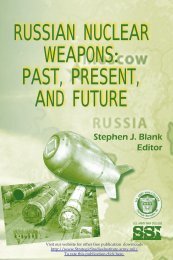The United States and China in Power Transition - Strategic Studies ...
The United States and China in Power Transition - Strategic Studies ...
The United States and China in Power Transition - Strategic Studies ...
Create successful ePaper yourself
Turn your PDF publications into a flip-book with our unique Google optimized e-Paper software.
from the Ch<strong>in</strong>ese po<strong>in</strong>t of view, the era of American<br />
dom<strong>in</strong>ation <strong>in</strong> Asia, which was an undesirable accident<br />
<strong>in</strong> the first place, should be com<strong>in</strong>g to an end.<br />
<strong>Ch<strong>in</strong>a</strong>’s leaders are [already] ask<strong>in</strong>g themselves: Why<br />
should distant, flawed, self-<strong>in</strong>terested America be the<br />
hegemon <strong>in</strong> a part of the world where for the better<br />
part of two millennia <strong>Ch<strong>in</strong>a</strong> reigned supreme? As far<br />
as we can tell, the entire leadership <strong>in</strong> Beij<strong>in</strong>g has by<br />
now been swept <strong>in</strong>to the view represented by that<br />
question. 43<br />
By the same token, the <strong>United</strong> <strong>States</strong> will do everyth<strong>in</strong>g<br />
it can to prevent <strong>Ch<strong>in</strong>a</strong> from ga<strong>in</strong><strong>in</strong>g its hegemonic<br />
position <strong>in</strong> Asia. Mearsheimer said that his theory<br />
did not have any normative or ideological bias; it<br />
was an offensive realist’s account of the brutal nature<br />
of great power politics. In October 2003, Mearsheimer<br />
made a 12-day visit to <strong>Ch<strong>in</strong>a</strong> (his first), giv<strong>in</strong>g his uncompromis<strong>in</strong>g<br />
talks to people at <strong>Ch<strong>in</strong>a</strong>’s prestigious<br />
universities, high-profile policy th<strong>in</strong>k tanks, <strong>and</strong> even<br />
the Ch<strong>in</strong>ese Foreign M<strong>in</strong>istry. He reassured his hosts<br />
everywhere: his talks were noth<strong>in</strong>g personal; he had<br />
noth<strong>in</strong>g aga<strong>in</strong>st the Ch<strong>in</strong>ese people; but the fear of a<br />
<strong>Ch<strong>in</strong>a</strong> threat was just a natural reaction from the <strong>United</strong><br />
<strong>States</strong>. 44<br />
Hunt<strong>in</strong>gton, however, framed the <strong>Ch<strong>in</strong>a</strong> threat <strong>in</strong><br />
an entirely different way. First, he rejected the universal<br />
state envisioned by the West <strong>and</strong> articulated by<br />
successive American leaders, <strong>and</strong> more forcefully by<br />
Francis Fukuyama <strong>in</strong> his “<strong>The</strong> End of History” essay. 45<br />
Hunt<strong>in</strong>gton argued that Western culture <strong>and</strong> civilization<br />
were also historical phenomena; their assertions<br />
followed the material success <strong>and</strong> failure of the <strong>United</strong><br />
<strong>States</strong> <strong>and</strong> the West, which happened to have been <strong>in</strong><br />
undisputed relative decl<strong>in</strong>e for quite some time; as the<br />
56

















